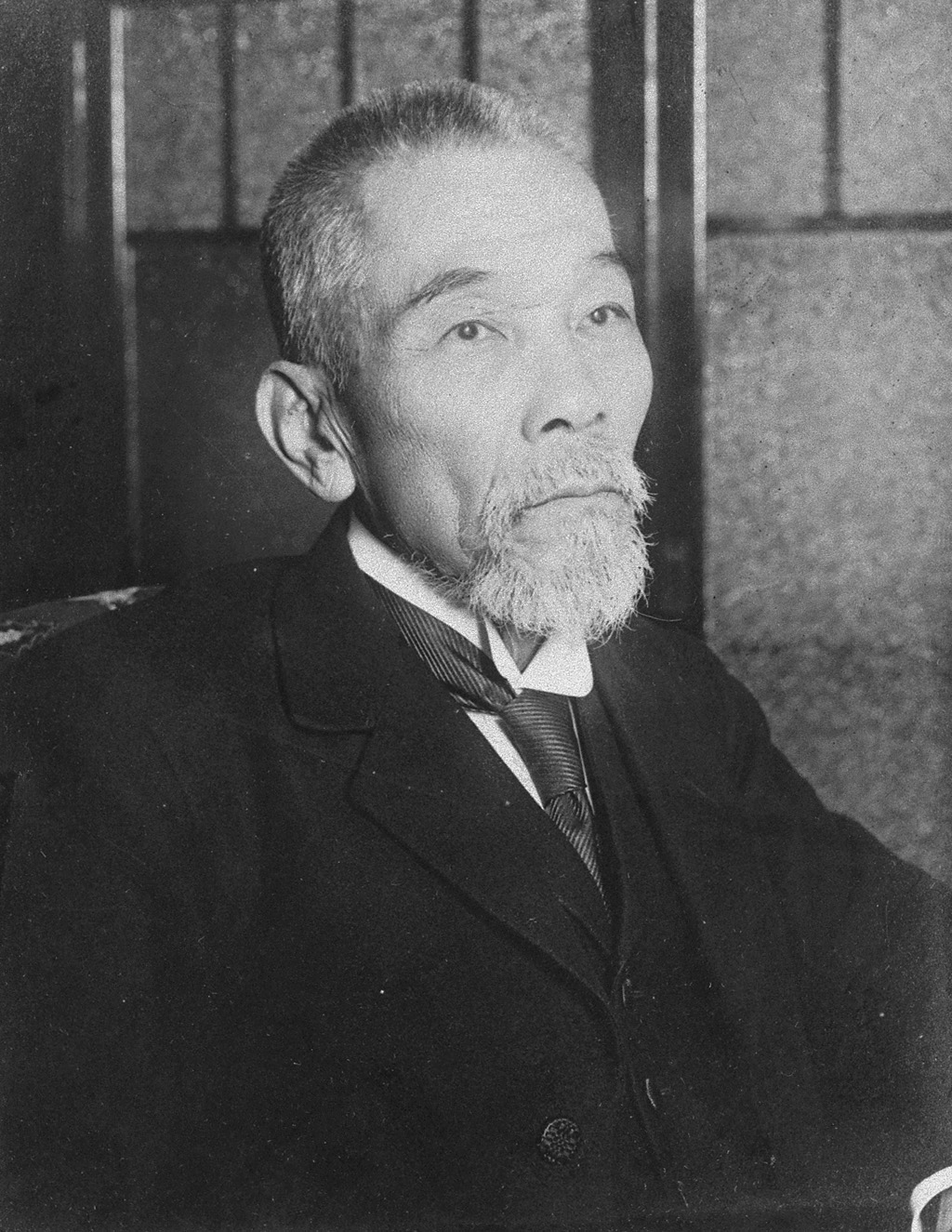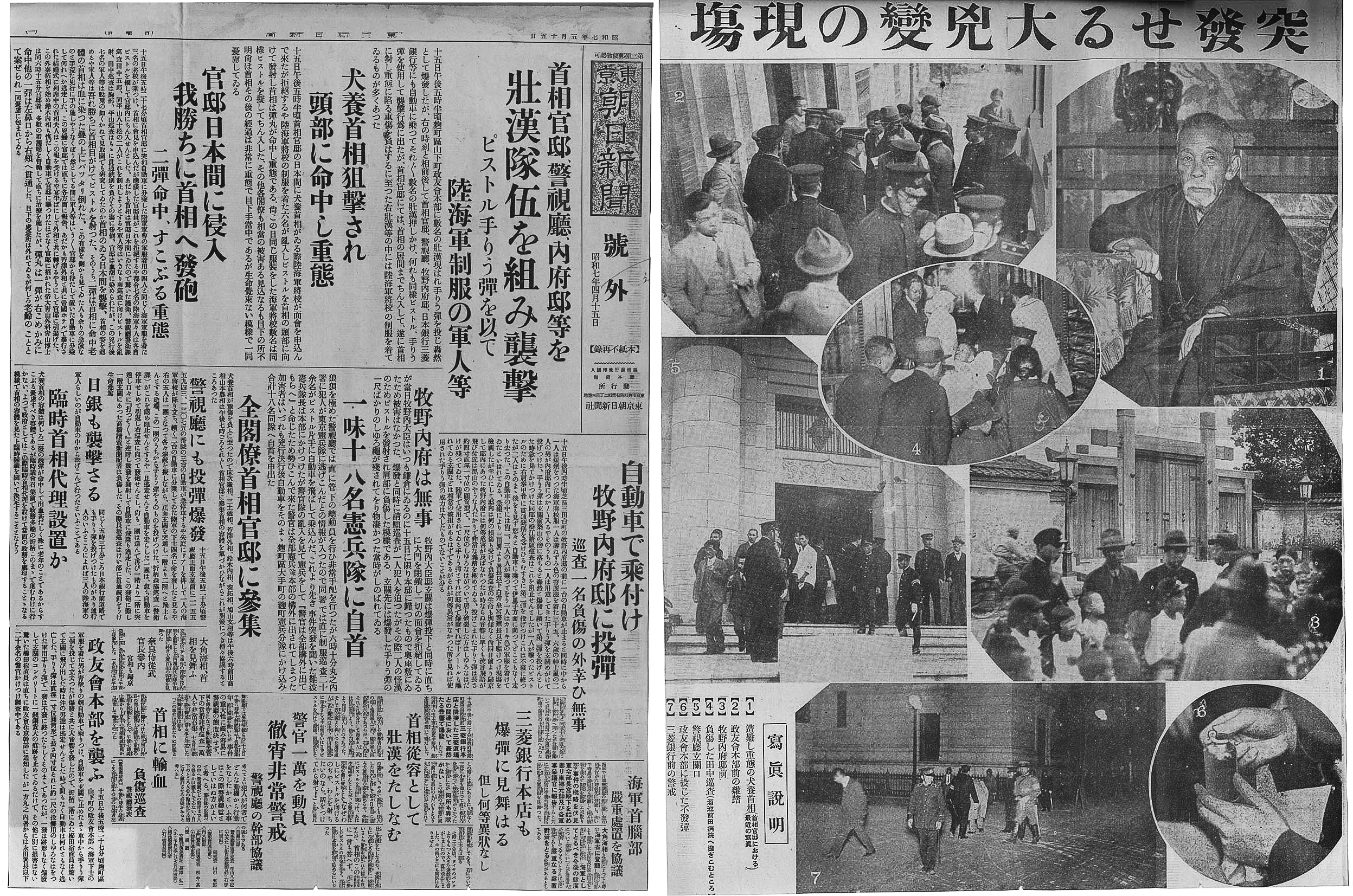|
Kakushin Club
The Kakushin Club () was a political party in Japan. History The party was established on 8 November 1922 as a merger of the Rikken Kokumintō (29 National Diet members), the Mushozoku Club (14 Diet members) and three independents.Haruhiro Fukui (1985) ''Political parties of Asia and the Pacific'', Greenwood Press, pp594–595 Dominated by the influence of Inukai Tsuyoshi, the Kakushin Club was the most democratic party of its age in Japan; it supported democratising politics by the immediate introduction of universal male suffrage and the election of prefectural governors. It also supported reforms to the economy and education, and an internationalist foreign policy, and attracted attention due to the relatively high number of female members. In 1923 the party held talks with the Kenseikai about a merger, but the two parties were unable to reach agreement over who would lead the new party. However, following the 1924 elections in which the Kakushin Club won 30 seats, it joine ... [...More Info...] [...Related Items...] OR: [Wikipedia] [Google] [Baidu] |
Inukai Tsuyoshi
Inukai Tsuyoshi (, 4 June 1855 – 15 May 1932) was a Japanese statesman who was Prime Minister of Japan, prime minister of Japan from 1931 to his assassination in 1932. At the age of 76, Inukai was Japan's second oldest serving prime minister, after Kantarō Suzuki whose term ended at the age of 77. Early life and education Inukai was born 4 June 1855, in Kawairi, Kaya, Bitchū Province (in present-day Okayama, Okayama Prefecture), the second son of Inukai Genzaemon, a samurai, district magistrate and local official (''Nanushi, ōjōya''). His family was a branch of the Itakura clan, and were originally given a status that allowed them to wear a katana by the Niwase Domain. In 1876, Inukai travelled to Tokyo and subsequently graduated from the Keio Gijuku (now Keio University) where he specialized in Chinese studies. In his early career, Inukai worked as a journalist for the Sports Hochi, ''Yūbin Hōchi Shimbun'' (now a sports newspaper subsidiary of the ''Yomiuri Shimbun'') a ... [...More Info...] [...Related Items...] OR: [Wikipedia] [Google] [Baidu] |
Katō Takaaki
Count was a Japanese politician, diplomat, and Prime Minister of Japan from 1924 until his death on 28 January 1926, during the period which historians have called " Taishō Democracy". He was also known as Katō Kōmei. Early life Katō was born as Hattori Sokichi, the second son of a former ''samurai'' retainer of the Owari Tokugawa domain in Nagoya, Owari Province, in the town of Saya, Ama District in what is now part of the city of Aisai, Aichi Prefecture. He was adopted by Katō Bunhei at the age of 13, and attended the University of Tokyo, from which he graduated at the top of his class from the Law Department in 1881, specializing in English common law. After graduation, he worked as an employee of Mitsubishi ''zaibatsu,'' and was sent to London for two years. On his return to Japan in 1885, he became an assistant manager at the Mitsubishi head office in Marunouchi, Tokyo. In 1886, he married Haruji, the eldest daughter of Iwasaki Yatarō, the president of Mitsubishi ... [...More Info...] [...Related Items...] OR: [Wikipedia] [Google] [Baidu] |
Political Parties Disestablished In 1925
Politics () is the set of activities that are associated with making decisions in groups, or other forms of power relations among individuals, such as the distribution of status or resources. The branch of social science that studies politics and government is referred to as political science. Politics may be used positively in the context of a "political solution" which is compromising and non-violent, or descriptively as "the art or science of government", but the word often also carries a negative connotation.. The concept has been defined in various ways, and different approaches have fundamentally differing views on whether it should be used extensively or in a limited way, empirically or normatively, and on whether conflict or co-operation is more essential to it. A variety of methods are deployed in politics, which include promoting one's own political views among people, negotiation with other political subjects, making laws, and exercising internal and external for ... [...More Info...] [...Related Items...] OR: [Wikipedia] [Google] [Baidu] |
1922 Establishments In Japan
Nineteen or 19 may refer to: * 19 (number) * One of the years 19 BC, AD 19, 1919, 2019 Films * ''19'' (film), a 2001 Japanese film * ''Nineteen'' (1987 film), a 1987 science fiction film * '' 19-Nineteen'', a 2009 South Korean film * '' Diciannove'', a 2024 Italian drama film informally referred to as "Nineteen" in some sources Science * Potassium, an alkali metal * 19 Fortuna, an asteroid Music * 19 (band), a Japanese pop music duo Albums * ''19'' (Adele album), 2008 * ''19'', a 2003 album by Alsou * ''19'', a 2006 album by Evan Yo * ''19'', a 2018 album by MHD * ''19'', one half of the double album '' 63/19'' by Kool A.D. * ''Number Nineteen'', a 1971 album by American jazz pianist Mal Waldron * ''XIX'' (EP), a 2019 EP by 1the9 Songs * "19" (song), a 1985 song by British musician Paul Hardcastle * "Stone in Focus", officially "#19", a composition by Aphex Twin * "Nineteen", a song from the 1992 album ''Refugee'' by Bad4Good * "Nineteen", a song from the 20 ... [...More Info...] [...Related Items...] OR: [Wikipedia] [Google] [Baidu] |
Political Parties Established In 1922
Politics () is the set of activities that are associated with making decisions in groups, or other forms of power relations among individuals, such as the distribution of status or resources. The branch of social science that studies politics and government is referred to as political science. Politics may be used positively in the context of a "political solution" which is compromising and non-violent, or descriptively as "the art or science of government", but the word often also carries a negative connotation.. The concept has been defined in various ways, and different approaches have fundamentally differing views on whether it should be used extensively or in a limited way, empirically or normatively, and on whether conflict or co-operation is more essential to it. A variety of methods are deployed in politics, which include promoting one's own political views among people, negotiation with other political subjects, making laws, and exercising internal and external for ... [...More Info...] [...Related Items...] OR: [Wikipedia] [Google] [Baidu] |
Defunct Political Parties In Japan
Defunct may refer to: * ''Defunct'' (video game), 2014 * Zombie process or defunct process, in Unix-like operating systems See also * * :Former entities * End-of-life product In Industry (economics), industry, product lifecycle management (PLM) is the process of managing the entire lifecycle of a product from its inception through the Product engineering, engineering, Product design, design, and Manufacturing, ma ... * Obsolescence {{Disambiguation ... [...More Info...] [...Related Items...] OR: [Wikipedia] [Google] [Baidu] |
Shinsei Club school
{{dab ...
Shinsei may refer to: * Shinsei (真正町), Gifu, a former town in Japan, now part of Motosu, Gifu * SBI Shinsei Bank, a Japanese commercial bank * Shinsei Shōnin (1443–1495), a priest of the Japanese Buddhist Tendai , also known as the Tendai Dharma Flower School (天台法華宗, ''Tendai hokke shū,'' sometimes just ''Hokkeshū''), is a Mahāyāna Buddhist tradition with significant esoteric elements that was officially established in Japan in 806 by t ... [...More Info...] [...Related Items...] OR: [Wikipedia] [Google] [Baidu] |
Chūsei Club
The Chūsei Club (, ') was a pro-business political party in Japan. History The party was established by a group of 42 MPs in May 1924 following the 1924 Japanese general election, May elections; 28 were first-time MPs and the remaining 14 were re-elected MPs, including some who had been members of the Koshin Club.Haruhiro Fukui (1985) ''Political parties of Asia and the Pacific'', Greenwood Press, p458 In May 1925 talks were held about a merger with Rikken Seiyūkai and the Kakushin Club. Although a merger did not happen, the Chūsei Club was dissolved when twenty of its MPs joined with the Reformist Club to form the Shinsei Club, eleven joined Rikken Seiyūkai and the remaining one became an independent. References Defunct political parties in Japan Political parties established in 1924 1924 establishments in Japan Political parties disestablished in 1925 1925 disestablishments in Japan Political parties in the Empire of Japan {{Japan-party-stub ... [...More Info...] [...Related Items...] OR: [Wikipedia] [Google] [Baidu] |
1924 Japanese General Election
General elections were held in Japan on 10 May 1924.Thomas T Mackie & Richard Rose (1991) ''The International Almanac of Electoral History'', Macmillan, p281 No party won a majority of seats, resulting in Kenseikai, Rikken Seiyūkai and the Kakushin Club forming the country's first coalition government led by Katō Takaaki. Electoral system The 464 members of the House of Representatives were elected in 295 single-member constituencies, 68 two-member constituencies and 11 three-member constituencies. Voting was restricted to men aged over 25 who paid at least 3 yen a year in direct taxation.Mackie & Rose, p276 Campaign A total of 972 candidates contested the elections, of which 265 were from Kenseikai, 242 from Seiyūhontō, 218 from Rikken Seiyūkai, 53 from the Kakushin Club and 194 from minor parties or running as independents. Results References {{Japanese elections General elections in Japan Japan Japan is an island country in East Asia. Located in the Pacifi ... [...More Info...] [...Related Items...] OR: [Wikipedia] [Google] [Baidu] |
Rikken Kokumintō
The Rikken Kokumintō () was a minor political party in the Empire of Japan. It was also known as simply the Kokumintō. History The ''Kokumintō'' was founded in March 1910, by a merger of the ''Kensei Hontō'' with a number of minor political parties and groups within the House of Representatives of Japan, Lower House of the Japanese Diet, and was dominated by Inukai Tsuyoshi. It advocated a constitution, an electoral franchise based on universal adult male suffrage and increased spending for the Imperial Japanese Navy. It took a strong stand against the power and influence of the ''genrō'' and Meiji oligarchy.Sims. Japanese Political History, p. 100 In the 1912 Japanese general election, 1912 general elections the new party secured 95 seats, making it the single largest opposition party (to the Rikken Seiyūkai) in the Lower House. In January 1913, about half of the party defected to join the ''Rikken Dōshikai'' founded by Katsura Tarō. In the 1915 Japanese general election ... [...More Info...] [...Related Items...] OR: [Wikipedia] [Google] [Baidu] |
Kenseikai
The was a short-lived political party in the pre-war Empire of Japan. History The ''Kenseikai'' was founded on 10 October 1916, as a merger of the ''Rikken Dōshikai'' (led by Katō Takaaki), ''Chūseikai'' (led by Ozaki Yukio) and the ''Kōyū Club'' (a minor opposition group). Led by Katō Takaaki, the new party was united by its opposition to the policies of the ruling ''Rikken Seiyūkai'' under Prime Minister of Japan, Prime Minister Ōkuma Shigenobu. The party was supported financially by the Mitsubishi ''zaibatsu,'' due to family ties with Katō Takaaki. Party leaders included Osachi Hamaguchi, Hamaguchi Osachi and Adachi Kenzō. The merger gave the ''Kenseikai'' a total of 198 seats in the House of Representatives of Japan, Lower House of the Diet of Japan, thus forming a majority, and raised the expectation that Katō Takaaki would become the next prime minister. However, the position of prime minister was a direct appointment from the Emperor of Japan, Emperor per advi ... [...More Info...] [...Related Items...] OR: [Wikipedia] [Google] [Baidu] |





